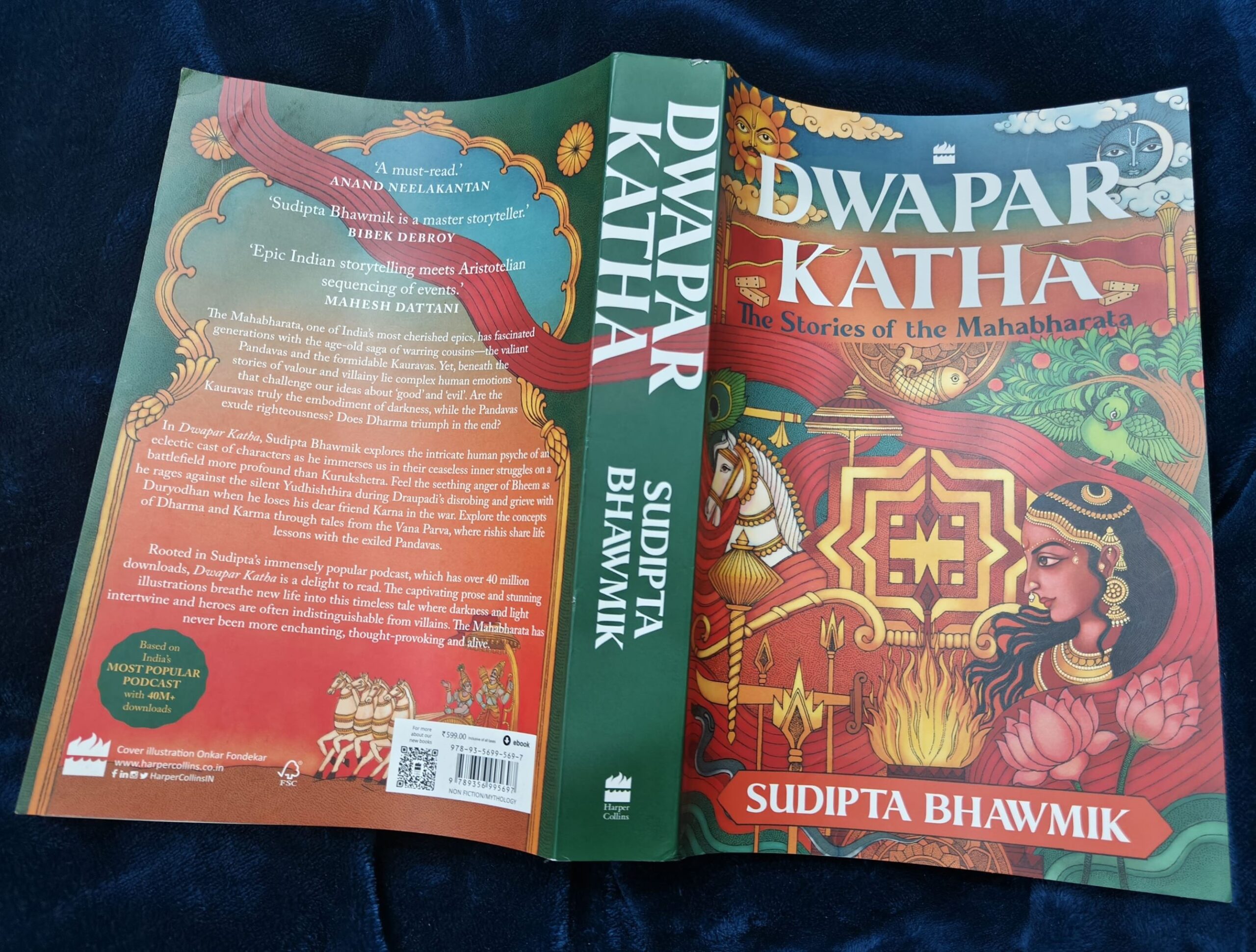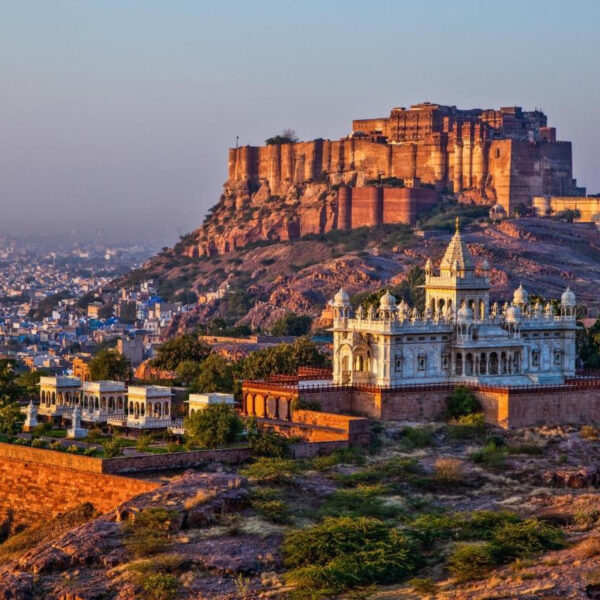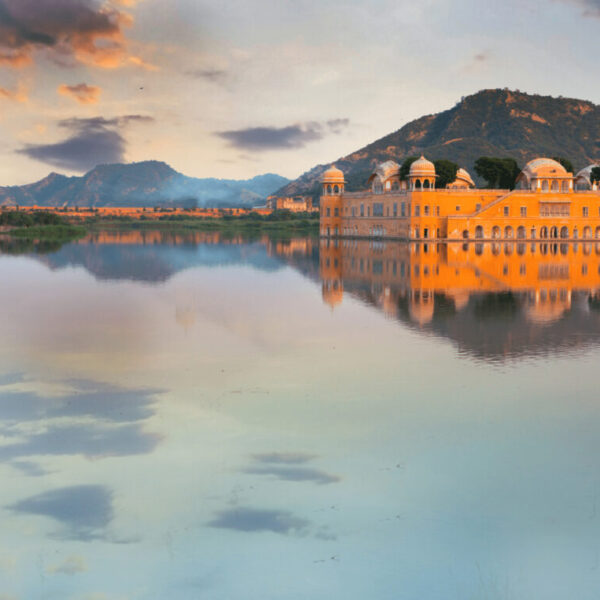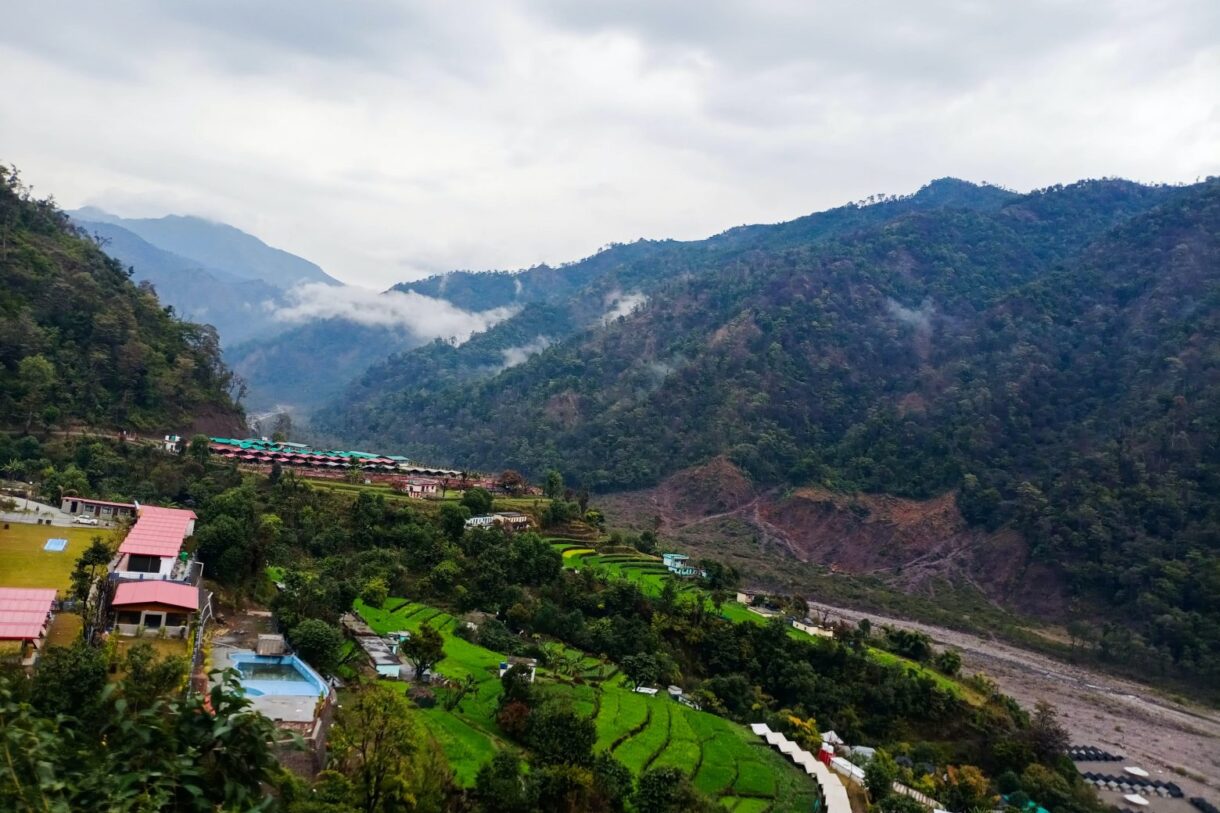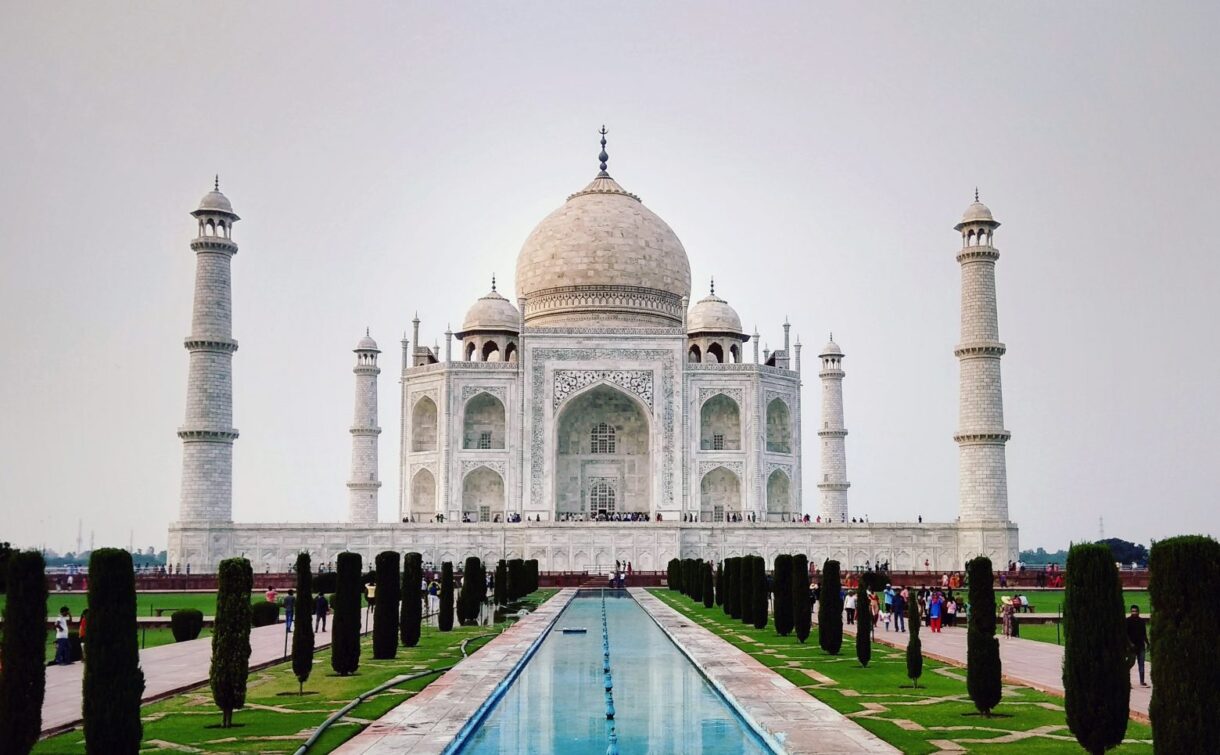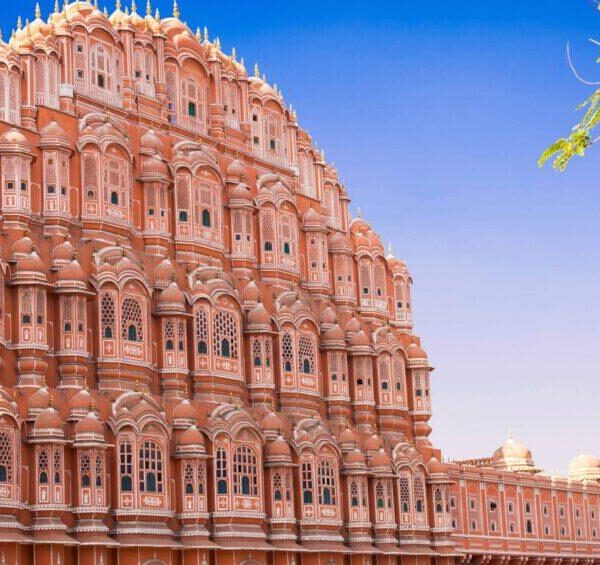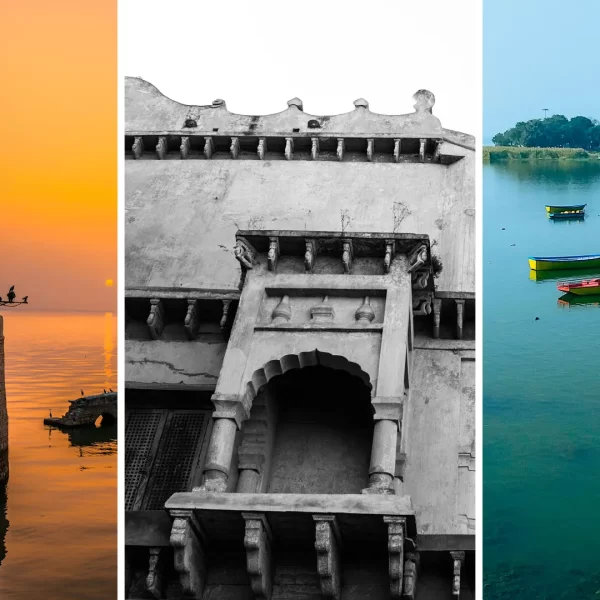Title of the Book: Dwapar Katha: The Stories of the Mahabharata Author: Sudipta Bhawmik Genre: Mythology Pages: 586 pages Publisher: Harper Collins India
Dwapar Yug – the third of four Yugas in Hindu cosmology
Dwapara Yuga is the age in which humanity shows its first significant decline in righteousness and only two pillars of religion remains: compassion and truthfulness.
This Yug is marked by the birth of Krishna, an avatar of Lord Vishnu, who guides humanity back to the path of dharma. It witnessed the epic Kurukshetra battle, a pivotal conflict between righteousness and injustice, immortalized in the Mahabharata.
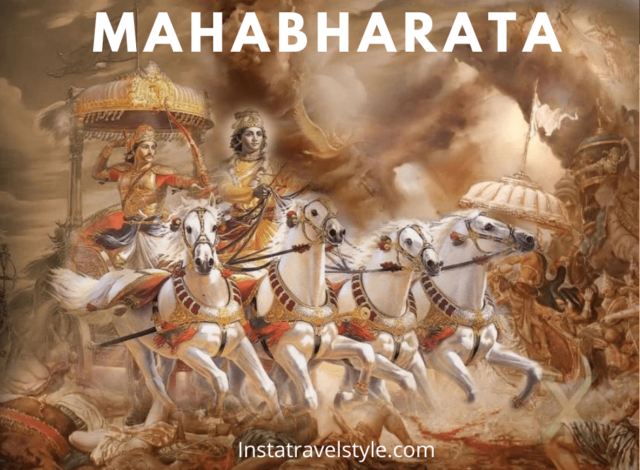
Most importantly, this Yug witnessed Krishna’s timeless teachings to Arjuna, embodied in the Bhagavad Gita, which became a guiding light for him and continues to illuminate a way of life for people even today.
The Mahabharata, the most ancient Indian epic ever written, enthralls us with its over 100,000 shloka. However, in our busy lives, finding the time to delve into its depths can be a challenge. This challenge is amplified for those living abroad, facing not only the epic’s length but also potential language barriers. This has led many to rely on television shows to gain a glimpse into the world of the Mahabharata. Author Sudipta Bhawmik understood this challenge and recognized the need to bring these ancient tales closer to modern readers by making it easy for everyone thus translating the stories into clear and engaging English for a better reach.
About the Book
Starting with the birth of Bhishma, son of King Shantanu and Devi Ganga, the threads darken with the abduction of Devi Ambika. Torn between her love for the King of Shalva and her family obligations, Ambika takes a vow to avenge Bhishma when he rejects her due to his oaths.
The book then explores the contrasting births of the Pandavas and Kauravas, sons of Pandu and Dhritarashtra respectively, whose childhood rivalry escalates into a bloody battle for the throne of Hastinapura.
It encompasses key moments like the training of Pandavas’ and Kauravas’ under Guru Dronacharya, the poignant tale of Eklavya’s sacrifice, Draupadi’s renowned swayamvar and her unique marriage to five brothers; each chapter also explores the Pandavas’ other unions, including Bhima’s with Hidimba and Arjuna’s to Subhadra, sister of Shri Krishna, and Chitrangada, daughter of the King of Manipur. Briefly and accurately, it delves into the key aspects of both the Kauravas’ and Pandavas’ lives. What I appreciate most is the author’s faithfulness to Krishna Dwaipayana Vyasa’s narrative, refraining from personal interpretations and allowing the epic itself to guide the reader’s journey.
Not only the life of Kauravas and Pandavas, but the book also explores the stories of some great men and sages in our ancient history.
While guiding the Pandavas on a pilgrimage to holy places, Sage Lomash regaled them with these captivating stories.
Lessons Beyond the Battlefield
- The story of Ashtavakra, who learned the Vedas in his mother’s womb, went on to defeat Bandi, son of Varuna, the water god, in a fierce battle of wits and knowledge at King Janaka’s court.
- The book brims with inspiring stories, one of which is that of Rishi Mudgal. His unparalleled patience and virtue teach us the essence of selflessness. He even refused the chance to ascend to heaven alive, choosing instead to attain moksha through his unwavering dedication.
- The most kind and righteous King Ushinara, faced with a seemingly impossible test, sacrificed his own flesh to save a dove from a hawk. Unknowingly, he offered this selfless act to Lord Indra and Lord Agni, who had disguised themselves as birds to test his virtue.
- How Vishnu assumed the boar avatar (Varaha) and lifted the Earth on his tusk to ease its burden.
- Another story recounts how the esteemed Rishi Durvasa arrived as a guest at the Pandavas’ when they had nothing to offer him and his ten thousand disciples. Miraculously, after Krishna ate a single grain from Draupadi’s pot, Rishi Durvasa and his disciples felt full and departed without needing food, thus saving the Pandavas.
- The narrative also explains how Bhagiratha, through immense penance and divine intervention, brought the River Ganga down to Earth, granting salvation to his ancestors.
Mahabharat unravels the tangled threads of human nature and decodes the secret language of our subconscious, where desires whisper and fears echo.
It was King Jaydratha’s insatiable desire, which enthralled him to Draupadi’s beauty, that led him to the brazen act of abducting her.
It’s a story of war, victory, and defeat, where the Pandavas, blessed by the gods, rise to the challenge. Lord Krishna himself became Arjuna’s charioteer, guiding him through the battlefield with his wisdom and divine power. Even Lord Hanuman, the valiant monkey god, played a part in their destiny. Disguised as a weak monkey, he playfully tested Bhima’s strength before later bestowing his blessing: to reside on Arjuna’s chariot flag throughout the battle, a symbol of their unwavering faith and Hanuman’s enduring support.
The Mahabharata delves deeply into philosophical questions about Dharma (righteousness), Karma (action and consequence), and the nature of existence.
It explores the complexities of duty, morality, and self-realization, offering timeless wisdom on living a meaningful life.
In the face of Draupadi’s suffering, the Kuru court remained mute, their silence a chilling testament to human cowardice. Only one Kuru brother, Vikarna, dared to rise against his kin, a lone voice in defense of her dignity.
The Mahabharata showcases how human greed and arrogance can culminate in downfall. Duryodhana’s arrogance rendered all diplomacy futile, as he refused to listen to pleas for peace.
This serves as a stark reminder: we must be vigilant not to let pride consume us. It can cloud our judgment, leading us to poor decisions and blinding us to our shortcomings.
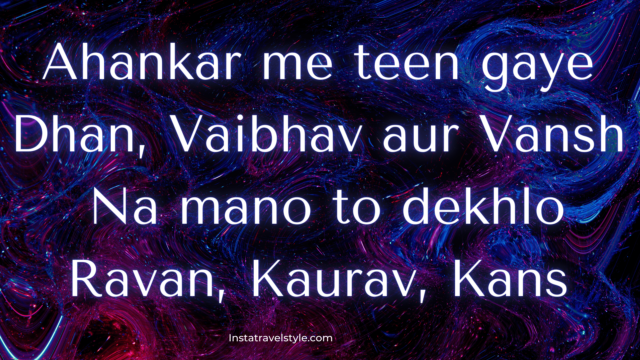
With this, I remember some lines :
Ahankar me teen gye dhan, Vaibhav aur Vansh Na mano to dekh lo Ravan, Kaurav, Kans.
(Translated in English)
Pride took away wealth, glory, and lineage. If you don't believe it, look at Ravana, the Kauravas, and Kansa.
The Mahabharata, even centuries after its creation, continues to captivate the minds of readers and scholars.
Dwapar Katha: The Stories of the Mahabharata is a collection of timeless tales. These narratives serve not only as a captivating journey through mythology, history, and philosophy, but also as a philosophical and religious guide, filled with heroic deeds, tragic downfalls, and profound insights into human nature.
Immerse yourself in the captivating retelling of the Mahabharata through “Dwapar Katha – The Stories of the Mahabharata.” Discover why Sage Agasthya swallowed the vast ocean along with many other enthralling tales. Witness the legendary journey of the Kauravas and Pandavas as their destinies culminate in the epic Kurukshetra war.
About the Author
 Sudipta Bhawmik, an award-winning actor, director, and playwright Sudipta Bhawmik has appeared on stages around the tri-state area. Sudipta is a semiconductor design engineer by profession and has a Ph.D, M.Tech, and B.Tech degrees from IIT Kharagpur, India. Sudipta has several patents, publications, and awards to his credit. He is a published cartoonist, a book illustrator, and a regular blogger. His blog nynjbengali.com is a popular read amongst Bengali netizens around the world.
Sudipta Bhawmik, an award-winning actor, director, and playwright Sudipta Bhawmik has appeared on stages around the tri-state area. Sudipta is a semiconductor design engineer by profession and has a Ph.D, M.Tech, and B.Tech degrees from IIT Kharagpur, India. Sudipta has several patents, publications, and awards to his credit. He is a published cartoonist, a book illustrator, and a regular blogger. His blog nynjbengali.com is a popular read amongst Bengali netizens around the world.
This review is powered by the Blogchatter Book Review Program. You can buy the book from Amazon
